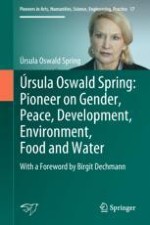This book aims to initiate among students and other readers critical and interdisciplinary reflections on key problems concerning development, gender relations, peace and environment, with a special emphasis on North-South relations. This volume offers a selection of the author's research in different parts of the world during 50 years of contributing to an interdisciplinary scientific debate and addressing social answers to urgent global problems. After the author's biography and bibliography, the second part analyses the development processes of several countries in the South that resulted in a dynamic of underdevelopment. The deep-rooted gender discrimination is also reflected in the destructive exploitation of natural resources and the pollution of soils, water and air. Since the beginning of the Anthropocene in the mid-20th century, the management of human society and global resources has been unsustainable and has created global environmental change and multiple conflicts over scarce and polluted resources. Peace and development policies aiming at gender equity and sustainable environmental management, where water and food are crucial for the survival of humankind, focus on systemic alternatives embedded in a path of sustainability transition.
• This book reviews multiple influences from Europe, Africa and Latin America on a leading social scientist and activist on gender, development and environment aiming at a world with equity, sustainability, peace and harmony between nature and humans.• This pioneer volume analyses social and environmental conflicts and peace processes in Latin America, with a special focus on Mexico, by addressing the development of under-development, global environmental change, poverty, nutrition and the North-South gap.• This volume focuses on environmental deterioration with a special emphasis on food and water and proposes systemic changes towards a sustainability transition with peace, regional development and gender equity.• This pioneering work offers alternative approaches to regional development, food sovereignty and holistic development processes from a gender perspective.
